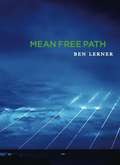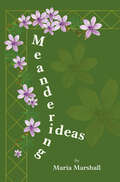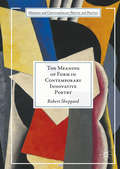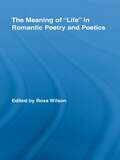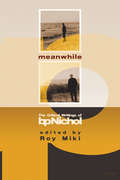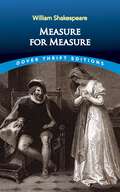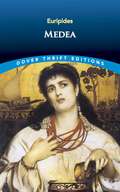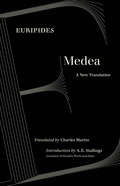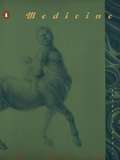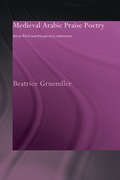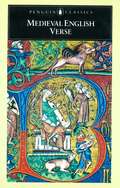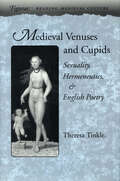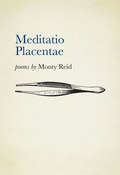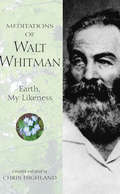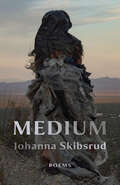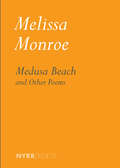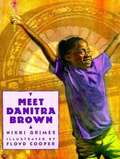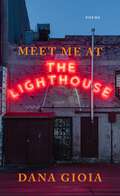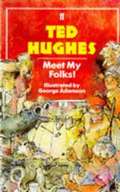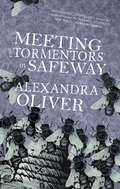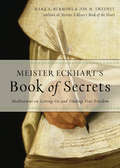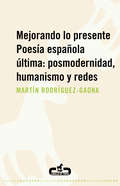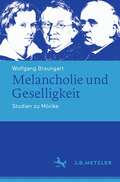- Table View
- List View
Mean Free Path
by Ben Lerner"Lerner [is] among the most promising young poets now writing."--Publishers Weekly"Sharp, ambitious, and impressive." --Boston ReviewNational Book Award finalist Ben Lerner turns to science once again for his guiding metaphor. "Mean free path" is the average distance a particle travels before colliding with another particle. The poems in Lerner's third collection are full of layered collisions--repetitions, fragmentations, stutters, re-combinations--that track how language threatens to break up or change course under the emotional pressures of the utterance. And then there's the larger collision of love, and while Lerner questions whether love poems are even possible, he composes a gorgeous, symphonic, and complicated one.You startled me. I thought you were sleepingIn the traditional sense. I like lookingAt anything under glass, especiallyGlass. You called me. Like overheardDreams. I'm writing this one as a womanComfortable with failure. I promise I will neverBut the predicate withered. If you areUncomfortable seeing this as portraitureClose your eyes. No, you startledBen Lerner is the author of three books of poetry and was named a finalist for the National Book Award for his second book, Angle of Yaw. He holds degrees from Brown University, co-founded No: a journal of the arts, and teaches at the University of Pittsburgh.
Meandering Ideas
by Maria MarshallFollowing Maria Marshall’s A Child’s War, her memoir of family life during World War 2, this first collection of her poetry covers subjects ranging from the beauty of nature to mind-boggling discoveries about the universe, as well as places and events in Kilkenny City, where she and her late husband Peter lived for the last 20 years.
The Meaning of Form in Contemporary Innovative Poetry
by Robert SheppardThis study engages the life of form in contemporary innovative poetries through both an introduction to the latest theories and close readings of leading North American and British innovative poets. The critical approach derives from Robert Sheppard's axiomatic contention that poetry is the investigation of complex contemporary realities through the means (meanings) of form. Analyzing the poetry of Rosmarie Waldrop, Caroline Bergval, Sean Bonney, Barry MacSweeney, Veronica Forrest-Thomson, Kenneth Goldsmith, Allen Fisher, and Geraldine Monk, Sheppard argues that their forms are a matter of authorial design and readerly engagement.
The Meaning of Life in Romantic Poetry and Poetics (Routledge Studies in Romanticism)
by Ross WilsonThis volume brings together an impressive range of established and emerging scholars to investigate the meaning of ‘life’ in Romantic poetry and poetics. This investigation involves sustained attention to a set of challenging questions at the heart of British Romantic poetic practice and theory. Is poetry alive for the Romantic poets? If so, how? Does ‘life’ always mean ‘life’? In a range of essays from a variety of complementary perspectives, a number of major Romantic poets are examined in detail. The fate of Romantic conceptions of ‘life’ in later poetry also receives attention. Through, for examples, a revision of Blake’s relationship to so-called rationalism, a renewed examination of Wordsworth’s fascination with country graveyards, an exploration of Shelley’s concept of survival, and a discussion of the notions of ‘life’ in Byron, Kierkegaard, and Mozart, this volume opens up new and exciting terrain in Romantic poetry’s relation to literary theory, the history of philosophy, ethics, and aesthetics.
Meanwhile
by Roy Miki Bp NicholRepresenting a substantial collection of bpNichol's critical writing from the mid-1960s to the year of his death, 1988, Meanwhile puts him on the vanguard of Canadian literature and critical theory. This collection is essential to our sense of Nichol not only as a writer, but also as a person of exemplary generosity, imagination and intellectual range.
Measure for Measure: Unabridged (Dover Thrift Editions: Plays)
by William ShakespeareOne of Shakespeare's "dark comedies," Measure for Measure is as noteworthy for its fascinating political and social implications as for its compelling characters: a duke masquerading as a monk, a would-be nun ordered to sacrifice her chastity to save her brother's life, and a self-righteous courtier, professing his incorruptibility while concealing a depraved private life.In this engrossing drama set in 16th-century Vienna, Duke Vincentio attempts to enforce the city's long-ignored morality laws, which results in a death sentence for Claudio, a young man accused of seducing and impregnating his fiancée. Isabella, his sister, attempts to gain a pardon for him, but refuses when she is asked to exchange her virtue for her brother's life.Claudio eventually is freed and utter tragedy is averted, as Shakespeare explores with force and sensitivity the basis of good government, public and private morality, and the balancing of justice and mercy, among other themes.
Medea
by EuripidesOne of the most powerful and enduring of Greek tragedies, Medea centers on the myth of Jason, leader of the Argonauts, who has won the dragon-guarded treasure of the Golden Fleece with the help of the sorceress Medea. Having married Medea and fathered her two children, Jason abandons her for a more favorable match, never suspecting the terrible revenge she will take. Euripides' masterly portrayal of the motives fiercely driving Medea's pursuit of vengeance for her husband's insult and betrayal has held theater audiences spellbound for more than twenty centuries. Rex Warner's authoritative translation brings this great classic of world literature vividly to life.
Medea: A New Translation
by EuripidesThe Medea of Euripides is one of the greatest of all Greek tragedies and arguably the one with the most significance today. A barbarian woman brought to Corinth and there abandoned by her Greek husband, Medea seeks vengeance on Jason and is willing to strike out against his new wife and family—even slaughtering the sons she has born him. At its center is Medea herself, a character who refuses definition: Is she a hero, a witch, a psychopath, a goddess? All that can be said for certain is that she is a woman who has loved, has suffered, and will stop at nothing for vengeance. In this stunning translation, poet Charles Martin captures the rhythms of Euripides’ original text through contemporary rhyme and meter that speak directly to modern readers. An introduction by classicist and poet A.E. Stallings examines the complex and multifaceted Medea in patriarchal ancient Greece. Perfect in and out of the classroom as well as for theatrical performance, this faithful translation succeeds like no other.
Medicine
by Amy GerstlerAmy Gerstler has won acclaim for complex yet accessible poetry that is by turns extravagant, subversive, surreal, and playful. In her new collection, Medicine, she deploys a variety of dramatic voices, spoken by such disparate characters as Cinderella's wicked sisters, the wife of a nineteenth-century naturalist, a homicide detective, and a woman who is happily married to a bear. Their elusive collectivity suggests, but never quite defines, the floating authorial presence that haunts them. Gerstler's abiding interests -- in love and mourning, in science and pseudo-science, in the idea of an afterlife -- are strongly evident in these new poems, which are full of strong emotion, language play, surprising twists, and a wicked sense of black humor.
Medicine
by Amy GerstlerAmy Gerstler has won acclaim for complex yet accessible poetry that is by turns extravagant, subversive, surreal, and playful. In her new collection, Medicine, she deploys a variety of dramatic voices, spoken by such disparate characters as Cinderella's wicked sisters, the wife of a nineteenth-century naturalist, a homicide detective, and a woman who is happily married to a bear. Their elusive collectivity suggests, but never quite defines, the floating authorial presence that haunts them. Gerstler's abiding interests--in love and mourning, in science and pseudo-science, in the idea of an afterlife--are strongly evident in these new poems, which are full of strong emotion, language play, surprising twists, and a wicked sense of black humor.
Medieval Arabic Praise Poetry: Ibn Al-Rumi and the Patron's Redemption (Routledge Studies in Middle Eastern Literatures #No. 2)
by Beatrice GruendlerThis book gives an insight into panegyrics, a genre central to understanding medieval Near Eastern Society. Poets in this multi-ethnic society would address the majority of their verse to rulers, generals, officials, and the urban upper classes, its tone ranging from celebration to reprimand and even to threat.
Medieval English Verse
by Brian StoneShort narrative poems, religious and secular lyrics, and moral, political, and comic verses are all included in this comprehensive collection of works from the thirteenth and fourteenth centuries.
Medieval Venuses and Cupids
by Theresa TinkleMedieval Venuses and Cupids analyses the transformations of the love deities in later Middle English Chaucerian poetry, academic Latin discourses on classical myth (including astrology, natural philosophy, and commentaries on classical Roman literature), and French conventions that associate Venus and Cupid with Ovidian arts of love. Whereas existing studies of Venus and Cupid contend that they always and everywhere represent two loves (good and evil), the author argues that medieval discourses actually promulgate diverse, multiple, and often contradictory meanings for the deities. The book establishes the range of meanings bestowed on the deities through the later Middle Ages, and draws on feminist and cultural theories to offer new models for interpreting both academic Latin discourses and vernacular poetry.
Meditatio Placentae
by Monty ReidFrom yoghurt tubs to pop-up books to bobcats, from cement trucks to lost socks to the products of conception, Meditatio Placentae, Monty Reid's twelfth collection, is a book about unruly stuff. Stuff that functions but also stuff that exceeds, stuff that dreams. A gathering of short poems wrapped into longer sequences, this is a book that pays attention to the world, in all its dizzying forms. The poems in Meditatio Placentae cluster around certain ideas, experiences, narratives; sometimes they cohere, sometimes they only assemble, but they are always at crossroads where people and objects collide. In these poems matter itself--including the placenta of the title poem--is vibrant, and argues for its rightful recognition.
Meditations of Walt Whitman
by Chris HighlandA pocket-sized compendium of passages from Walt Whitman's Leaves of Grasspaired with the relevant words of a variety of historical and contemporary thinkers, such as Margaret Fuller, Friedrich Nietzsche, Jane Goodall, Mark Twain, Marc Chagall, Helen Keller, Buddha, Dante, and Bhagavad Gita
Medium
by Johanna SkibsrudFrom award-winning writer Johanna Skibsrud, Medium uses language as a bridge across experience, sensibility, and time.These deeply resonant and performative poems share the lives and perspectives of women who— in their roles as biological, physical, or spiritual mediums— have helped to shape the course of history. Reckoning with the dominant historical narratives of each woman' s era, Skibsrud underscores the power of poetry to bring about new formulations for understanding the relationship between past and present, self and other.Helen of Troy, Anne Boleyn, Shakuntala Devi, Hypatia of Alexandria, Marie Curie: Medium interprets the voices of women vilified by history, silenced by famous husbands, forced into sex work, or wrongly accused.Each exploration begins with a brief vignette inspired by the “ vidas” that once began manuscripts of the troubadours. Both vidas and poems provide lyrical reinterpretations of real and imagined elements in the lives of scholars, scientists, computer engineers, mystics, entrepreneurs, artists, nurses, and other leaders.
Medusa Beach
by Melissa MonroeA new collection from one of the most exciting voices in American poetry.For many years, Melissa Monroe has been assembling one of the most distinctive bodies of work in contemporary American poetry, drawing on all different kinds of writing, from technical manuals to books of spells to dictionaries of slang, to explore the many ways—poetry is, after all, one of them—in which we human beings seek to know and control the elusive realities of the world around and within us. Her subject is both the strangeness of things and the strangeness of the things we think, and she has an unsurpassed eye for the wilderness between them that we inhabit. The poems collected in Medusa Beach include &“Planetogenesis,&” recording the life of an imaginary planet; &“Whiz Mob,&” a sequence of haikus composed in the criminal argot of 1940s America; &“Frequently Asked Questions About Spirit Photography&”; and the title poem, which interweaves an account of the life and thought of the great German philosopher and marine biologist Ernst Haeckel with a meditation on the many historical and natural historical avatars of the figure of Medusa. As formally adventurous as they are rigorous, disconcertingly comic, and deeply strange, the poems in Medusa Beach are the work of a true American original.
Meet Danitra Brown
by Nikki GrimesZuri Jackson wants readers to meet her friend, Danitra Brown, the "most splendiferous girl in town." In 13 spirited rhymes, Zuri narrates an unforgettable portrait of the many ways in which friends bring out the best in each other.
Meet Me at the Lighthouse: Poems
by Dana GioiaDana Gioia has been hailed for decades as a master of traditional lyric forms, whose expansive and accessible poems are offerings of rare poignancy and insight. In Meet Me at the Lighthouse, he invites us back to old Los Angeles, where the shabby nightclub of the title beckons us into its noirish immortality. Elsewhere, he laments the once-vibrant neighborhood where he grew up, now bulldozed, and recalls his working-class family of immigrants. Gioia describes a haunting from his mother on his birthday, Christmas Eve. Another poem remembers his uncle, a US Merchant Marine. And “The Ballad of Jesús Ortiz” tells the story of his great-grandfather, a Mexican vaquero who was shot dead at a tavern in Wyoming during a dispute over a bar tab. “I praise my ancestors, the unkillable poor,” Gioia writes. This book is dedicated to their memory. Including poems, song lyrics, translations, and concluding with an unsettling train ride to the underworld, Meet Me at the Lighthouse is a luminous exploration of nostalgia, mortality, and what makes a life worth living and remembering.
Meet My Folks!
by Ted HughesOther folk's folks get so well known, And nobody knows about my own. Meet a host of strange and wonderful characters as Ted Hughes introduces us to his family.
Meeting the Tormentors in Safeway
by Alexandra OliverA CANADIAN POETRY BOOK OF THE YEAR, THE NATIONAL POST"Alexandra Oliver has many arrows in her quiver-all of them sharpened to a fine point. This is an excellent and entertaining collection."-TIMOTHY STEELEIn Meeting the Tormentors in Safeway, Alexandra Oliver zooms in on the inertias, anxieties, comedies, cruelties, and epiphanies of domestic life:They all had names like Jennifer or Lynneor Katherine; they all had bone-blonde hair,that wet, flat cut with bangs. They pulled your chairfrom underneath you, shoved their small fists inyour face. Too soon, you knew it would begin,those minkish teeth like shrapnel in the air,the Bacchic taunts, the Herculean dare,their soccer cleats against your porcine shin,that laugh, which sounded like a hundred birdsescaping from a gunshot through the reeds-and now you have to face it all again:the joyful freckled faces lost for wordsin supermarkets, as those red hands squeezeyour own. It's been so long! They say. Amen.Oliver's poems, which she describes as "text-based home movies," unveil a cinematic vision of suburbia at once comical and poignant: framed to renew our curiosity in the mundane and pressing rhyme and metre to their utmost, Meeting the Tormentors in Safeway is a five-star performance from Canada's new formalist sensation."Alexandra Oliver is in full command of a saber wit and impeccable ear. Lucky the reader along for the ride."-JEANNE MARIE BEAUMONT"Brilliantly contemporary poems in traditional forms, the work of a stunning new voice."-CHARLES MARTINAlexandra Oliver was born in Vancouver, Canada and divides her time between Toronto and Glasgow, Scotland. Her most recent book is Meeting the Tormentors in Safeway (Biblioasis). She currently teaches in the Stonecoast MFA Program at the University of Southern Maine.
Meister Eckhart's Book of Secrets: Meditations on Letting Go and Finding True Freedom
by Jon M. Sweeney Mark S. BurrowsAn elegant rendering of the great mystic's thoughts on the mysteries of the authentic life <P><P>This is a little book about soul freedom. It is a book about discovering the secret to all the things we most desire: contentment, meaning, peace of mind, and true freedom. This skillfully edited translation of selections from the writings of Meister Eckhart provides a roadmap to the spiritual life for contemporary seekers. <P><P> Eckhart takes us on a journey of discovery; a journey in which we learn to let go, relinquish our need to know everything, and lose those things that we think are important for a life of worth. And in the end he shows us that the true secret is this: to find yourself, you must lose yourself.Here is timeless wisdom from a medieval mystic who has influenced a wide range of spiritual teachers and mystics both inside and outside the Christian tradition. Erich Fromm, Arthur Schopenhauer, Dag Hammarskjöld, Eckhart Tolle, Richard Rohr, D. T. Suzuki, Rudolf Steiner, and Matthew Fox have all credited Eckhart as being an important influence on their thought. In addition, his work has influenced the development of 20th-century American Buddhism and the Theosophical tradition.Divided into five sections—Seeking the Light, Facing Darkness, Risking Love, Knowing Nothing, and Embracing Everything—the book leads readers on the path to an authentic spiritual life.
Mejorando lo presente
by Martín Rodríguez-GaonaPues si Paul Éluard dijo aquello tan sabio y rotundo de "La poesía es algo absolutamente necesario aunque me gustaría saber para qué", imagínense lo que diría de un ensayo sobre poesía: "Este libro es absolutamente innecesario y por tanto polémico, inevitable, posmoderno y personal". Si la poesía, Homero dixit, es un virus troyano programado para alterar el disco duro de la imaginación colectiva y un poeta es un explorador o un señuelo lingüístico que se envía por delante para tratar de localizar los campos de minas, un ensayo es una resonancia semántica del cuerpo poético que nos ha tocado en suerte y nos muestra de qué adjetivos cojeamos y de qué sustantivos andamos escasos.La poesía como moneda no mercantil, expulsada de la lógica del mercado y por tanto suelta, promiscua, disponible y viajera. Fuera del mercado pero invadiendo las nuevas geografías virtuales. Poetas con afanes similares de independencia y ruptura, surgidos sin contar con una plataforma o programa común, y que expresan sus intuiciones sobre asuntos de gran relevancia: la subjetividad construida por los medios de comunicación, los avances tecnológicos y científicos, la globalización, etc.- elaborando nuevas propuestas bajo una certidumbre extraña. Una convicción en buena medida ajena a criterios de repercusión social o económica: la certeza de que el arte verbal mantiene su vigencia en la era postindustrial como un reflejo primordial de la experiencia humana. No spam. Agregar a favoritos.
Mejorando lo presente. Poesía española última: Poesía española última: posmodernidad, humanismo y redes
by Martín Rodríguez-GaonaUn polémico ensayo sobre la poesía española más viva, dinámica y actual, esa que nace de un movimiento poético multiforme y desprovisto de plataforma, formado por un grupo numeroso de autores y autoras que irrumpe en la escena literaria con obras renovadoras, de inusual energía y calidad, en un tiempo donde la literatura comercial parecía imponerse completamente. Aviso de lectura Pues si Paul Éluard dijo aquello tan sabio y rotundo de «La poesía es algo absolutamente necesario aunque me gustaría saber para qué», imagínense lo que diría de un ensayo sobre poesía: «Este libro es absolutamente innecesario y por tanto polémico, inevitable, posmoderno y personal». Si la poesía, Homero dixit, es un virus troyano programado para alterar el disco duro de la imaginación colectiva y un poeta es un explorador o un señuelo lingüístico que se envía por delante para tratar de localizar los campos deminas, un ensayo es una resonancia semántica del cuerpo poético que nos ha tocado en suerte y nos muestra de qué adjetivo cojeamos y de qué sustantivos andamos escasos. La poesía como moneda no mercantil, expulsada de la lógica del mercado y por tanto suelta, promiscua, disponible y viajera. Fuera del mercado pero invadiendo las nuevas geografías virtuales. Poetas con afanes similares de independencia y ruptura, surgidos sin contar con una plataforma o programa común, y que expresan sus intuiciones sobre asuntos de gran relevancia -la subjetividad construida por los medios de comunicación, los avances tecnológicos y científicos, la globalización, etc.- elaborando nuevas propuestas bajo una certidumbre extraña. Una convicción en buena medida ajena a criterios de repercusión social o económica: la certeza de que el arte verbal mantiene su vigencia en la era postindustrial como un reflejo primordial de la experiencia humana. No spam. Agregar a favoritos.
Melancholie und Geselligkeit: Studien zu Mörike
by Wolfgang BraungartWenigen Dichtern der Moderne gelingt es so wie Mörike, Literatur aus dem sozialen Lebenszusammenhang hervorgehen zu lassen und auf ihn zu beziehen. Dabei steigern und intensivieren sich Kunst und Leben wechselseitig. Mit höchster poetischer Sensibilität macht Mörike seine Literatur durchlässig für das soziale Leben; ja, er macht es zu einem Formprinzip. Die durchgehende, poetisch so produktive Melancholie seines Werkes, von der Forschung oft beobachtet, zeigt aber, dass Freundschaft, Geselligkeit, soziale Zugehörigkeit die poetische Subjektivität nicht wirklich beheimaten können, so sehr sie sich genau danach sehnt. Der Band versammelt Studien zur Lyrik und zu den Erzählungen "Mozart auf der Reise nach Prag" und "Das Stuttgarter Hutzelmännlein".
